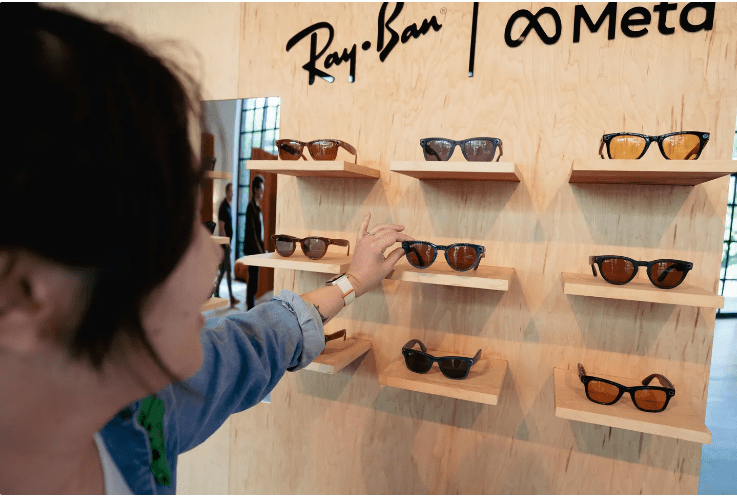Meta annual developer conference: Quest 3 and smart glasses can save the meta universe?
On September 27, US Eastern Time, Facebook's parent company Platforms released a blockbuster Quest 3 headset and second-generation smart glasses during its annual developer conference Connect.。The launch of these two new products marks a shift from virtual reality to mixed reality, which combines virtual reality and augmented reality.。
On Wednesday, September 27, Eastern Time, Facebook's parent company Platforms unveiled a blockbuster Quest 3 headset and second-generation smart glasses during its annual developer conference Connect.。The launch of these two new products marks a shift from virtual reality to mixed reality, which combines virtual reality and augmented reality.。
It is worth noting that at this developer conference, Meta also announced that all of its apps will be blessed by artificial intelligence chatbots, which will provide the company's 3 billion users with an experience similar to OpenAI's ChatGPT.。
Specifically, Meta said at its annual Connect developer conference on Wednesday that Instagram, Messenger and WhatsApp will launch custom sticker making, image editing and a series of celebrity face chatbot characters that are all integrated into generative artificial intelligence.。
Meta's AI assistant can edit images, design trips for users to share with friends in chat groups, and answer questions that users usually ask search engines for solutions.。
Meta AI, the tech giant's new text-based chatbot, will run on its large language model, Llama 2, and work with Microsoft's Bing to search for information.。The company defines it as a digital assistant that can answer questions about real-time information or be used to generate images.。
In addition, Meta has introduced a developer studio for brands to build their own AI tools based on Meta's messaging service, which can also be used to chat with customers.。
Mark Zuckerberg, CEO of Meta, said in a keynote speech: "Advances in AI allow us to create different AI roles that help us accomplish different things.。"。"Our view is that people want to interact with a bunch of different AIs and do different things that you want to do.。"
Quest 3 or Vision Pro?
Another high-profile product of this developer conference is the new Quest 3 of its Quest head display series.。The new generation of Quest 3, starting at $200 to $499 more than the previous generation of Quest 2, released in 2020, an increase of about 67%。The basic Quest 3 comes with 128GB of RAM, and the internal storage space is upgraded to 512GB. The version is priced at 649.99美元。According to the news, Quest 3 can accept bookings on Wednesday and will start shipping on October 10.。

This is a big time for Meta's hardware business。Although the company has dominated the industry position of VR headsets for years, Apple also announced this year that it is preparing to release its Vision Pro headsets in the coming months.。Like the Quest 3, the Vision Pro is a mixed-reality headset, and although it uses technology and content that is unique to Apple, and the Vision Pro will have Apple's marketing power, its price is relatively much higher.。According to Apple official sources, its MR Head Display Vision Pro is priced at $3,499。
In addition to peer competitive pressures, it is difficult for Meta to sell products to consumers in the meta-universe。Metaverse is a collection of interconnected networked worlds that leverage their VR devices。
The social media giant embraced the concept of a meta-universe in 2021 and even changed its name from Facebook to Meta.。But after weak sales and stagnant use of headsets, the company shifted its focus to artificial intelligence and more marketable technologies.。Meta is now touting its headset as a game and productivity tool, similar to the way Apple is expected to launch Vision Pro。
According to Counterpoint Research, at present, Meta is still the leader in the head display industry, accounting for nearly half of the market.。But this is a money-losing proposition for Meta, and the big question is whether mainstream consumers will eventually embrace these products.。
You know, Meta spent a lot of money on launching these devices。The company's Reality Labs business unit is losing billions of dollars a year, including $3.7 billion in the most recent quarter.。But if Meta is going to be a meta-universe company, it's certainly inseparable from these devices.。
Going back to the product itself, Quest 3 is the latest attempt to broaden the appeal of the technology。Headphone users can switch between VR and Mixed Reality (XR) by simply double-clicking on the side of the device。The wearer can use the more immersive VR option while watching a movie or playing a game, and then switch to XR mode while browsing the web and viewing photos。In this case, the data and images will be overlaid on top of the real-world view around the user。
In terms of configuration, Quest 3 resolution has also increased by 30%, and uses Qualcomm's faster Snapdragon XR2 second-generation processor with 8GB of RAM。Quest 3, equipped with a new processor, has twice the processing power of Quest 2, which can improve graphics rendering, operate more smoothly, and load applications faster。

In addition, Quest 3 is also thinner than Quest 2, and adds improved speakers and new controllers。At the same time, Quest 3 is also equipped with a two-color through camera, users can see the world around。
The device looks similar to the previous version, but has three sensors on the front。The left and right modules are cameras, while the central sensor is a new component that determines the location of objects and walls in the user's room。This allows the device to automatically place a virtual guardrail so that the user does not walk into the table。It can also be used for games, such as a title that allows players to photograph items on a wall。
In terms of functionality, Meta still sees the Quest 3 primarily as a gaming device.。In addition to adapting everything about Quest 2, Quest 3 has a number of new games coming in, such as Roblox, Assassin's Creed Nexus, and Wrath of Asgard 2.。Since Meta worked with Microsoft last year, Quest 3 users can enjoy the Xbox cloud gaming service and play Xbox games directly.。
Palwasha Khatri, product manager at Quest 3, said the device "does not require wires, does not require a battery pack."。According to the media, this rhetoric shows that Meta is trying to position the product as a more mainstream MR headset.。

It is worth noting that the market for virtual reality headsets is still a relatively small space。Meta is an industry leader with its various Quest products, including the Quest 2, released in October 2020, which sold particularly well during the pandemic.。But according to the Verge, the company has sold only 20 million units so far.。Meanwhile, Sony has sold 40 million PS5 consoles since November 2020.。
Can listen to music can take pictures of smart glasses?
In addition to Quest 3, Meta also released a new version of Ray-Ban Meta Smart Glasses during the Connect event on Wednesday, starting at $299, with pre-orders accepted on Wednesday and available on October 17.。Following Meta's "Ray-Ban Story," Ray-Ban Meta smart glasses are essentially a pair of glasses or sunglasses with a camera, speaker and microphone。

The new smart glasses are equipped with Qualcomm Snapdragon AR1 generation chips, with an audio system similar to the Amazon Echo Frames and Bose Tempo series, which can play music that only glasses users can hear。Meta has also significantly upgraded the glasses' microphone system, with one of the glasses' five microphones located at the bridge of the user's nose, which allows the user to answer calls and issue voice commands more clearly。
The second-generation smart glasses have improved the 12-megapixel camera to take higher-resolution photos and videos, and updated the speaker settings. In addition to the original Wayfarer design, they also use the new Headliner style。
Meta said that the battery of Ray-Ban Meta smart glasses can be mixed for four hours, including taking photos and videos, listening to music, etc.。It can also act as a camera, because there is a small camera on the right temple, users can store about 500 photos and 100 30-second videos on the glasses, all of which are synchronized through Meta's App View。
In addition to being used to take photos and record videos, users can also use glasses to broadcast live, just a few taps on the temple, you can start live on Facebook or Instagram。When recording a live broadcast, the white light around the lens will flash, indicating that the user is recording。
As for security and privacy concerns, Meta says it increases the size of the outward-facing LEDs to let people know when you take a photo or video.。The company also said that because the LED is connected to the camera hardware, it cannot be tampered with if the LED is not lit。
·Original
Disclaimer: The views in this article are from the original Creator and do not represent the views or position of Hawk Insight. The content of the article is for reference, communication and learning only, and does not constitute investment advice. If it involves copyright issues, please contact us for deletion.